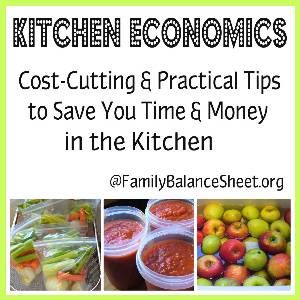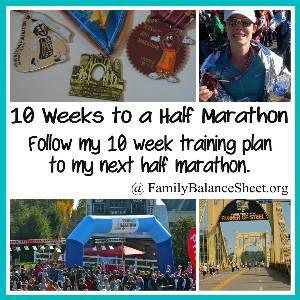Menu planning saves me time. Sure, there is time spent upfront; about 30 minutes for me each Sunday when I plan my menu and make a grocery list. But that 30 minutes makes my grocery trip go much smoother and with a pre-planned menu, dinner hour is spent preparing the meal, not wondering, “what are we having for dinner?”.
Menu planning saves my sanity. I no longer pull my hair out at dinner hour trying to figure out what ingredients I have on hand that would go with the frozen chicken that I did not take out in the morning to thaw. Because I menu plan, I pull frozen meat from the freezer the night before my planned meal. Because I menu plan, I'm not stressed over the inevitable question around 4 o'clock in the afternoon, "mommy, what's for dinner?".
Menu planning saves me money. With less trips to the store and a pre-planned list, I am hopefully limiting any impulse and redundant purchases. I also revolve my menu around what is on sale, so I'm spending less on our meals.
Eleven Strategies for Easier Meal Planning:
1. Pick a day that works best for you to do your meal planning. I plan my menu on Sunday afternoons when I have the new week’s grocery flyer in front of me. I try to keep my large weekly grocery shopping to one store unless there are some loss-leaders elsewhere.
2. Plan your menu around what is on sale at the grocery store that week. If whole chickens are on sale for .79/pound, you can bet that my menu that week will revolve around a roasted chicken, maybe Chicken Noodle Soup or Chicken and Black Bean Quesadillas or Pulled Chicken BBQ Sandwiches. I am always looking for great sales on our staples like chicken, turkey, fruits, vegetables, bread.
3. Keep your pantry, freezer and refrigerator organized so that you can cross reference what is on sale, the ingredients needed for recipes and what you have on hand.
4. Develop a system. I started using a menu/grocery list clip board and it works really well for me. It keeps my menu and list all in one place. You could also use a blank calendar or a simple notepad.

5. Get the family involved. Ask THEM for suggestions. Every week when I ask my , kids I inevitably hear, "I want pasta". My husband will chime in, “let’s grill”. I do try to appease everyone and it makes meal time a little more enjoyable.
6. On your designated planning day, pull out the family activity calendar. What is going on in the week ahead? Will everyone be home for dinner that week? Is there soccer practice, mid-week church activities or a late night at the office? On those hectic nights, quick and easy meals will be needed. Maybe even a crock-pot meal. Are you going to a pot-luck that week or somewhere else that would require you to make and take a dish? I make those notes on my clip board and then fill in meals accordingly.
7. Plan for breakfast, lunch and dinner. On hectic mornings, life is so much easier when breakfast is planned and there are ingredients on hand. Also, my husband tries his best to come home several times a week for lunch, so I need to make sure there will be food for him.
8. Plan for all seven days. I've been lazy in the past and just planned for the work week and ignored the fact that we do need to eat on the weekends. We usually eat out one night, but if I don't plan the other six days, then it becomes more than one night out and we end up over budget in that category.
9. Create a recipe binder. My binder is a very important part of my kitchen. It is full of recipes from magazines, friends, and online that I have collected over the years. Some people keep their recipes on the computer, but I don't have a convenient spot to keep my laptop when I am cooking, so I keep my favorite recipes in a binder. The first page in the binder is a master list (see photo below) of my family's favorite, quick fix, healthy meals. It is a quick reference tool, but I don't list all of the recipes in my binder, just the family favorites that are a regular part of our meal rotation. When I look in the freezer and see several packages of ground turkey, I then look on our list under Turkey for recipes.

10. Avoid boredom by trying at least one new recipe a week, maybe on a day that isn't hectic. For those hectic days, refer to your Master recipe list for easy suggestions.
11. Do you have an ingredient, but are stumped as to what to do with it? Check websites such as CookingLight.com or Allrecipes.com where you can enter a particular ingredient and the site will recommend recipes for you. This is how I found Turkey Sausage, Arugula and Sun-Dried Tomato Pasta and Roasted Tilapia with Tomatoes and Olives, two of our my family's favorite meals. And of course, don't forget to check the Recipes Tab at Family Balance Sheet for meal ideas too.
For me, meal planning is the strategy that saves me the most money on groceries. By planning our meals around what I have on hand, what is on sale at the grocery store and what my family likes to eat, I have been able to reduce our grocery bill to a number that I am comfortable with for our budget. But that one week where I don’t menu plan or do a shoddy job on it is the week that I’ll blow my budget. Menu planning takes a little time and effort, but the rewards are a reduced grocery bill, no worries at night about 'what's for dinner', and hopefully a less stressed cook in the kitchen.
Do you plan your meals? How often do you plan? Weekly, Bi-Weekly, Monthly? Let us know in the comments.
This post is linked to Frugal Friday at Life as MOM.

Welcome to the first Kitchen Economics Link Up ~ Cost Cutting Tips to Help You Save Money in the Kitchen.
A few Link Up guidelines:
- Please link a your cost-cutting kitchen tip. If you are not a blogger, please let us know your tip in the comment section.
- Please post the link to your tip post, NOT to your homepage. To do this, click on your tip post, copy and paste the whole url address into the Link up widget.
- I also ask that you post a link back to Family Balance Sheet in your article or grab the badge that is in the top left of the site.
- If you are reading this post via a reader or email, you will need to click through to post your link and to visit others who have linked up.
I'm looking forward to reading your tips and saving some money in the kitchen.
Thanks for reading. If you would like to receive FREE updates of FBS, there are four ways to do so:
- through your RSS Feed
- have updates sent to your email,
- become a fan and 'like' FBS on Facebook
- become a Twitter follower


































You are SO right! When I don't meal plan (or stick to it) I go over budget and I end up feeling more stress. Thanks for this great motivation and good tips.
ReplyDeleteWe don't get the supermarket's flyer until Monday, but many stores have an online version that gets posted on the Sunday already, so you're always able to plan ahead.
ReplyDeleteIf you have the time, recipe software (or a website like onetsp.com) helps to organise your recipes so you can search not only by ingredient, but whichever tags you create, such as "chicken"+"winter"+"lunch". I find the search functions on most recipes sites do not allow for such a refined search.